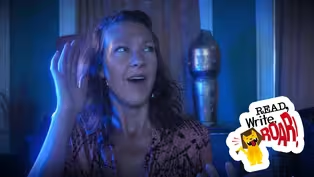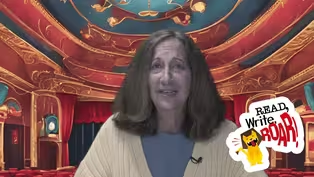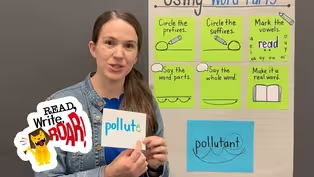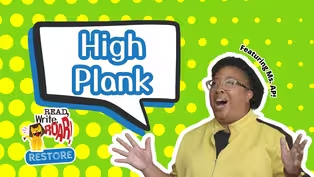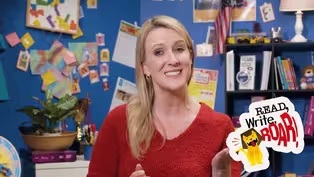Read, Write, ROAR!
Found Poem: Crafting Poetry from Existing Texts
Clip: Season 1 Episode 1013 | 5m 41sVideo has Closed Captions
Use rhythm, repetition, and rhyme, and rearrange the found words to create your own powerful poem.
What if you could write a poem without using your own words? Jeff Kass shows you how to create a "found poem" by digging through existing texts to find the perfect words and phrases. In this video, you’ll learn how to highlight key ideas, use rhythm, repetition, and rhyme, and rearrange the found words to create your own powerful poem. Ready to become a word miner? Let’s start digging!
Problems playing video? | Closed Captioning Feedback
Problems playing video? | Closed Captioning Feedback
Read, Write, ROAR! is a local public television program presented by Detroit PBS
Read, Write, ROAR!
Found Poem: Crafting Poetry from Existing Texts
Clip: Season 1 Episode 1013 | 5m 41sVideo has Closed Captions
What if you could write a poem without using your own words? Jeff Kass shows you how to create a "found poem" by digging through existing texts to find the perfect words and phrases. In this video, you’ll learn how to highlight key ideas, use rhythm, repetition, and rhyme, and rearrange the found words to create your own powerful poem. Ready to become a word miner? Let’s start digging!
Problems playing video? | Closed Captioning Feedback
How to Watch Read, Write, ROAR!
Read, Write, ROAR! is available to stream on pbs.org and the free PBS App, available on iPhone, Apple TV, Android TV, Android smartphones, Amazon Fire TV, Amazon Fire Tablet, Roku, Samsung Smart TV, and Vizio.
Providing Support for PBS.org
Learn Moreabout PBS online sponsorship[Music] one of the most important rules for writing poetry is well there really aren't any rules The great poet Lucille Clifton is known for saying poetry is a house with many rooms What she means is there are many many different ways to write poems Today we'll learn about a kind of poem where you the writer don't even use your own words to write Hi everybody I'm Jeff Cass and today while we look at how clean air in Michigan is important to our health we're also going to experiment with what's known as a found poem A poem you create from words you find in a work that someone else has written And it doesn't matter where the words come from Could be a book a newspaper article even a magazine How can you do this Think of yourself as a gold miner Except the landscape you're prospecting in in order to unearth the precious metal is a story or an article or even another poem that someone else originally wrote What you do is you dig through that piece of writing and look for nuggets of gold like words that are treasures you can use to write a poem Then once you found the words you want you arrange and rearrange them in whatever order you want to make a poem You can also use the following techniques to make what you create seem more poetic You can use rhythm That's the beat or flow of words when you read a story or a poem You can use repetition That's using the same words or phrases over and over and over and over and over and over again You can use rhyme when the middle and ending sounds of words are the same You know that game You can use line breaks where words jump to the next line and and stanza breaks a big pause between stanzas groups of lines Before we can create our found poem we first need to find the words most critical to the main idea of a piece of writing As I read the passage you'll see the most important words highlighted on the screen This is the goal we're digging for to create our poem Let me offer a quick example Here are two short paragraphs about air pollution Air pollution Sometimes air pollution is visible A person can see dark smoke pour from the exhaust pipes of large trucks or factories for example More often however air pollution is invisible Polluted air can be dangerous Even if the pollutants are invisible it can make people's eyes burn and make them have difficulty breathing It can also increase the risk of lung cancer Now it's time to dig for gold I mean words I'm gonna go through these paragraphs and highlight the treasures I think I can use in a poem I think I can use sometimes air pollution visible Definitely dark smoke pour from exhaust pipes Maybe I can write something about large trucks or factories Oh invisible is good Polluted air is a key phrase Eyes burn difficulty breathing risk and lung cancer Good I think I found my goal Now I'm going to use these selected words and phrases to create my found poem Remember the goal is to express the same main idea as the original article And the main idea in the original article seems to be that air pollution whether it's visible or invisible is dangerous So I'm going to try to write a poem to express that So here's my poem Air pollution Sometimes visible sometimes dark smoke from factories Sometimes exhaust pouring from pipes or large trucks Sometimes invisible Eyes burn Breathing difficult Lungs risk cancer Visible invisible dangerous Dangerous Dangerous Does my poem communicate the main idea that air pollution whether it's visible or invisible can be dangerous I think it does So let's take a closer look at what I did in my writing You can see I repeated certain words like sometimes and dangerous to stress their importance You can see I move words around Notice how I use line breaks and stanza breaks to organize my ideas You can see I even changed some words a little Like I turned difficulty into difficult and pores into pouring I'm not really changing the meaning just the part of speech so I can keep the flow of my poem There's no reason you can't break the rules like that You can even add a few other words that aren't in the article if you think you need them Remember poetry is a house with many rooms That means there's more than one way to write and interpret poetry I took the gold I found in the paragraphs polished them up a bit and made a poem Now it's your turn Find an article about air quality or pollution in Michigan Read through it Try to decide what you think the main idea is Then highlight words from the article you think you can use in a poem that's going to express that main idea Then take a deep breath hopefully of clean air and go ahead and find your poem Remember you can include repetition rhythm rhyme line breaks and stanza breaks to make your poem more interesting for your audience Have fun Thank you for joining us If you want more fun ways to practice literacy skills don't forget to subscribe to the Michigan Learning channel and be sure to check the description below for links to activity guides resources and more [Music] [Applause]
Video has Closed Captions
Clip: S1 Ep1013 | 2m 30s | Create the sounds of spaceships, mission control, and your own heartbeat in the silence of space. (2m 30s)
How to Add Sound to Your Story
Video has Closed Captions
Clip: S1 Ep1013 | 4m 32s | Explore how background sounds enhance the storytelling experience. (4m 32s)
Pollutant & Susceptible: Decoding Multisyllabic Words
Video has Closed Captions
Clip: S1 Ep1013 | 4m 37s | Explore the secrets of words like "pollutant" and "susceptible" with Mrs. Mora. (4m 37s)
Read, Write, ROAR! Restore - High Plank
Video has Closed Captions
Clip: S1 Ep1013 | 3m 14s | Build strength with Ms. AP as she leads you through the high plank hold in this 2-minute movement s (3m 14s)
Writing to Advocate for Clean Air
Video has Closed Captions
Clip: S1 Ep1013 | 6m 22s | Learn how to advocate for clean air by writing formal letters to Michigan’s Air Quality Division. (6m 22s)
Providing Support for PBS.org
Learn Moreabout PBS online sponsorship

- Home and How To

Hit the road in a classic car for a tour through Great Britain with two antiques experts.












Support for PBS provided by:
Read, Write, ROAR! is a local public television program presented by Detroit PBS
